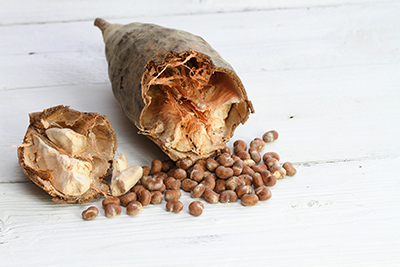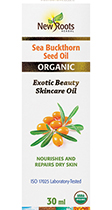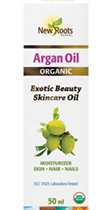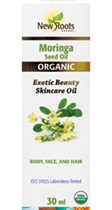Exotic Superstars: Oil Therapy for Your Skin
Exotic oils are bioactive plant oils that have been extracted from the seeds, kernels, or fatty portion of plants that—as suggested by their name—are rare or come from exotic locations. They are usually cold-pressed to extract the oil, and typically don’t contain much of its aroma. Essential oil, on the other hand, is extracted via a distillation process from the most fragrant part of the plant to impart the aromatic quality of that plant or the “essence.” Both exotic plant oils and essential oils can be used alone for topical and therapeutic application; however, it is important to carefully use the essential oils, as they can sometimes be irritating when applied directly onto the skin. This is why they are, most of the times, diluted in a carrier oil—which can be any vegetable oil or exotic oil—before topical application.
The use of plant oil is perhaps one of the most ancient forms of healing, dating back to 5000–4500 BCE. All the ancient worlds—Egypt, Greece, India, Mesopotamia, and China—used essential and exotic oils as medicine. The Europeans learned of therapeutic oils from Crusaders returning from their missions. The oldest recorded use of plant oils dates back to the Huangdi Nei Jing (the Yellow Emperor) about 2600 BCE, and it is still used in current traditional Chinese medicine (TCM). Ali ibn Sana, a renowned Middle Eastern physician (980 to 1037 CE) known in the West as Avicenna, discovered the method of distilling essential oils which is still in use today.
Benefits of Exotic Oils
Exotic-oil components can include a diversity of components such as triglycerides, free fatty acids (FFAs), tocopherols, sterols, stanols, phospholipids, waxes, squalene, phenolic compounds, etc. Each of these different compounds, when topically applied, influences skin physiology (skin barrier, inflammatory status, antioxidant response, and proliferation) differently.
Argan oil has been called “liquid gold” for its culinary and beneficial effects on our health, skin, and hair. Unrefined argan oil is used in cooking and salads very much like olive oil; however, argan oil won’t clog pores like olive oil. It has an anti-inflammatory effect when applied to the skin, due to its high content in antioxidant vitamin A, sterols, and phenols, and to its high dermal absorption. Argan oil is ideal for antiaging skin treatment and wound healing.
 Baobab seed oil is high in omega‑3s, known for their anti-inflammatory effects. Using baobab oil in massages is a great way to help heal damaged skin, as it can help regenerate and repair skin cells (while having a barrier/protection effect for dry skin) and inflamed skin as in the case of acne or rosacea.
Baobab seed oil is high in omega‑3s, known for their anti-inflammatory effects. Using baobab oil in massages is a great way to help heal damaged skin, as it can help regenerate and repair skin cells (while having a barrier/protection effect for dry skin) and inflamed skin as in the case of acne or rosacea.
Additional benefits of baobab oil are due to its high content in vitamins A and C, which is ideal as an antioxidant to fight oxidation damage from UV radiation, ultimately helping to minimize skin wrinkles and hyperpigmentation.
Sea buckthorn is an oil that is both edible and can be applied topically. Orally, it is known for its immune-boosting effect. Due to its high proportion of palmitoleic acid (omega‑7), which is also found in the fat of human skin, it is thought to speed wound healing, treat burns, and keep your skin healthy. Because of its rich nutrient content of 200 vitamins, minerals, and fatty acids (it may be the only plant in the world that contains omega‑3, ‑6, ‑7, and ‑9 together), it is considered one of the most valuable plants for pharmacological and cosmetic use for its anti-inflammatory, antiwrinkle, and moisturizing properties.
Moringa seed oil has three forms of vitamin E (α‑tocopherol, γ‑tocopherol, and δ‑tocopherol), more vitamin A than carrots, more vitamin C than oranges, and more potassium than bananas. This profile makes moringa oil a potent skincare ingredient for UV protection and a collagen booster. Moringa oil is lightweight and absorbs easily into the skin, without clogging pores or leaving a heavy oily residue, so it will leave a dewy glow on the skin.
Running Rumours
Many people mistakenly believe that exotic oils have comedogenic, or pore-clogging, effects. This may stem from the practice of mixing fragrant essential oils with thick carrier oils such as avocado, evening primrose, borage, or even olive oil, which do not offer the best penetration level.
Exotic-oil molecules are so small that, when applied to the skin, they can pass through its outer layer, the stratum corneum, into the dermis, then into the bloodstream.
It is important to note that the rate of absorption depends on the warmth and the thickness of the skin.
Harvesting Practices
We are aware of the term “organic,” but what does “wildcrafted” mean? Wildcrafted plant oils come from plants that grow in the wild, in their native habitats, rather than on farms or orchards. As such, they are not sprayed with any kind of pesticide. They are harvested in a sustainable manner without the use of synthetic products. If a whole plant is taken, it is replaced with seeds to grow a new vital plant. Growing in the wild and being exposed to its natural environment can impact the complexity of the oils within, as additional phytochemicals may be produced to protect its survival. Some of these phytochemicals are highly valued for their therapeutic effects, both topically for skincare and when ingested, with benefits for health and wellness. Organic harvested plant oil is a good alternative when wildcrafted choices are not available.
 Dr. Ky Lo, BA, BSc, ND, LAc
Dr. Ky Lo, BA, BSc, ND, LAc
Dr. Lo is a naturopathic doctor who graduated from the Canadian College of Naturopathic Medicine (CCNM) in 2006. With over 20 years in the medical esthetics industry, she combines her knowledge with naturopathic training to offer a unique perspective on antiaging.

 Stores
Stores


